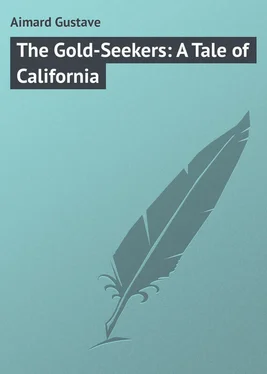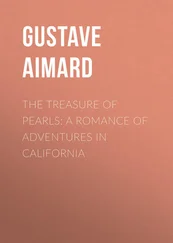Gustave Aimard - The Gold-Seekers - A Tale of California
Здесь есть возможность читать онлайн «Gustave Aimard - The Gold-Seekers - A Tale of California» — ознакомительный отрывок электронной книги совершенно бесплатно, а после прочтения отрывка купить полную версию. В некоторых случаях можно слушать аудио, скачать через торрент в формате fb2 и присутствует краткое содержание. Жанр: foreign_prose, foreign_adventure, на английском языке. Описание произведения, (предисловие) а так же отзывы посетителей доступны на портале библиотеки ЛибКат.
- Название:The Gold-Seekers: A Tale of California
- Автор:
- Жанр:
- Год:неизвестен
- ISBN:нет данных
- Рейтинг книги:5 / 5. Голосов: 1
-
Избранное:Добавить в избранное
- Отзывы:
-
Ваша оценка:
- 100
- 1
- 2
- 3
- 4
- 5
The Gold-Seekers: A Tale of California: краткое содержание, описание и аннотация
Предлагаем к чтению аннотацию, описание, краткое содержание или предисловие (зависит от того, что написал сам автор книги «The Gold-Seekers: A Tale of California»). Если вы не нашли необходимую информацию о книге — напишите в комментариях, мы постараемся отыскать её.
The Gold-Seekers: A Tale of California — читать онлайн ознакомительный отрывок
Ниже представлен текст книги, разбитый по страницам. Система сохранения места последней прочитанной страницы, позволяет с удобством читать онлайн бесплатно книгу «The Gold-Seekers: A Tale of California», без необходимости каждый раз заново искать на чём Вы остановились. Поставьте закладку, и сможете в любой момент перейти на страницу, на которой закончили чтение.
Интервал:
Закладка:
Aimard Gustave
The Gold-Seekers: A Tale of California
The "Gold-Seekers" must be regarded as forming the connecting link between the "Tiger-Slayer" and the "Indian Chief," the concluding volume of this series. It must not be forgotten that the author is dealing with real characters, and that the hero lived and died in the way hereafter to be described; and the three volumes may be considered a life-history of a very remarkable man. Although they may be perused separately with equal interest, I feel confident that those readers who have gone so far with me will desire to know the conclusion of this strange eventful history.
LASCELLES WRAXALL.PROLOGUE
I. – THE MEETING
On the 5th of July, 184-, at about six in the evening, a party of well-mounted horsemen started at a gallop from Guadalajara, the capital of the state of Jalisco, and proceeded along the road that traverses the village of Zapopan, celebrated for its miraculous virgin. After crossing the escarped summits of the Cordilleras, this road reaches the charming little town of Tepic, the usual refuge of those Europeans and rich Mexicans whom business carries to San Blas, but to whom the insalubrity of the air breathed in that port, the maritime arsenal of the Mexican union, would be mortal.
We have said that six o'clock was striking as the cavalcade passed the gateway. The officer of the watch, after bowing respectfully to the travellers, watched them for a long time, then re-entered the guardroom, shaking his head, and muttering to himself, —
"Heaven save me! What can Colonel Guerrero be thinking of, to set out on a Friday, and at such an hour as this? Does he fancy that the salteadores will allow him to pass? Hum! He will see what they are about at the barranca del mal paso (the gorge of the evil step)."
The travellers, however, probably unaffected by the superstitious fears that ruled the worthy officer, rapidly sped on the long poplar alley that extends from the town to Zapopan, caring neither for the advanced hour nor the ill-omened day of the week.
They were six in number – Colonel Sebastian Guerrero, his daughter, and four peons, or Indian criados. The colonel was a tall man, with harsh, marked features, and a bronzed complexion. The few silvery threads mingled with his black hair showed that he had passed middle life, although his robust limbs, upright stature, and the brilliancy of his glance denoted that years had not yet gained the mastery over this vigorous organisation. He wore the uniform of a Mexican field officer with the ease and nonchalance peculiar to old soldiers; but, in addition to the sabre hanging by his side, his holsters held pistols; and a rifle laid across the saddle-bow proved that, in case of need, he would offer a vigorous resistance to any robbers who ventured to attack him.
His daughter, Doña Angela, rode on his right hand. In Europe, where the growth of girls is not nearly so precocious as in America, she would only have been a child; for she counted scarce thirteen summers. As far as could be judged, she was slight, but graceful, and perfectly proportioned; her features were delicate and noble; her mouth laughing; her eyes black, quick, and flashing with wit; while her brown hair fell in two enormous tresses down upon her horse. She was wrapped up coquettishly in her rebozo , and laughed madly at every bound of her steed, which she maliciously tormented, in spite of her father's reiterated remonstrances.
The servants were powerfully-built Indians, armed to the teeth, and appeared capable of defending their master in case of need. They rode some ten paces behind the colonel, and led two mules loaded with provisions and baggage – an indispensable precaution in Mexico, if travellers do not wish to die of hunger by the way.
Mexico combines all the climates of the globe. From the icy peaks of the Cordilleras, down to the burning coasts of the ocean, the traveller in that country undergoes every temperature. Hence this vast territory has been divided into three distinct zones: las tierras calientes , or hot lands, composed of the plains on the seashore, and which produce sugar, indigo, and cotton in truly tropical abundance; las tierras templadas , or temperate lands, regions formed by the Cordilleras, and which enjoy an eternal spring, great heat and extreme cold being equally unknown there; and lastly, las tierras frias , or cold lands, which include the central plateaux, and where the temperature is relatively much lower than in the other zones.
Still we should remark that in Mexico the expressions "heat," and "cold," have not an absolute value as in Europe, and that the lofty plateaux, known as the tierras frias , enjoy a temperature like that of Lombardy, which would seem to any European a very pleasant climate. Owing to its position, Guadalajara shares in two of the three zones that divide Mexico. Situated on the limit of the tierra caliente and the tierra templada, the tepid breezes and pure sky reveal the warm regions of the seaboard, which extend thus far. The arid sands are succeeded by fertile and well-cultivated plains, fields of sugar-cane, Indian corn, bananas, goyaviers, and other productions of the tropical flora. By degrees the gloomy black oaks and pines, which only grow on the mountains, become rarer, and eventually disappear entirely, to make room for poplars, fan-palms, calabash trees, sumachs, Peru trees, and thousands of others, which proudly wave their superb crowns over the spontaneous vegetation that surrounds them.
In las tierras calientes , where the heat of the day is stifling, persons generally only travel from five to eleven A.M., and from three in the afternoon till ten at night, so as to enjoy the morning and evening freshness. Colonel Guerrero had, therefore, only conformed to the general custom by commencing his journey in the evening; but, as so often occurs, he had started later than he wished, owing to those numberless obstacles which ever supervene at the moment of departure, and cause a lengthened delay for no visible reason. But the colonel cared little about the advanced hour: a night march possessed no terrors for him, as he had been accustomed for years to modify his humour by circumstances, and yield to the exigencies of the situation in which he found himself.
The sun set behind the Peak of Teguilla, and the Cerro del Col disappeared in the centre of the chain of tall, abrupt hills which borders the Rio Tololotlan: gradually the scene was veiled in darkness. The travellers progressed gaily conversing together, while following the winding and accidented course of the Rio Grande del Norte, along whose banks their road ran. The latter was wide, well made, and easy to follow. Hence the colonel, after taking a careful glance around to assure himself there was nothing suspicious in the neighbourhood, trusted entirely to the vigilance of the criados, and resumed the conversation with his daughter, which he had for a moment broken off.
"Angela, my child," he said to her, "you are wrong to tease your horse so. Rebecca is a good beast, very gentle, and very sure-footed; and you should be more merciful to her than you are."
"I assure you, papa," the pretty girl answered with a laugh, "I am not in the least teasing Rebecca; on the contrary, I am only tickling her to render her lively."
"Yes, and to make her dance too, as I can plainly see, little madcap. That would be all very well if we were only taking a ride for a few hours, instead of a journey which will last a month. Remember, niña, that a rider must also treat his horse carefully if he wish to reach his destination safe, and sound. You would not like, I fancy, to be left on the road by your horse."
Читать дальшеИнтервал:
Закладка:
Похожие книги на «The Gold-Seekers: A Tale of California»
Представляем Вашему вниманию похожие книги на «The Gold-Seekers: A Tale of California» списком для выбора. Мы отобрали схожую по названию и смыслу литературу в надежде предоставить читателям больше вариантов отыскать новые, интересные, ещё непрочитанные произведения.
Обсуждение, отзывы о книге «The Gold-Seekers: A Tale of California» и просто собственные мнения читателей. Оставьте ваши комментарии, напишите, что Вы думаете о произведении, его смысле или главных героях. Укажите что конкретно понравилось, а что нет, и почему Вы так считаете.












